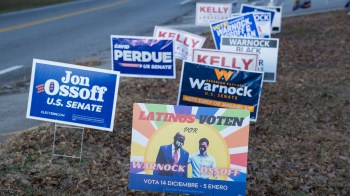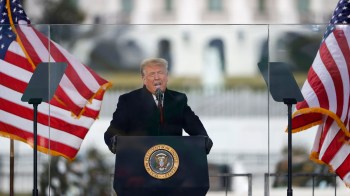Court case tests political spending laws
TEXT OF STORY
KAI RYSSDAL: This is probably a pretty easy thing to say if you’re a guy who’s raked in $234 million so far, but today Barack Obama called the public presidential campaign financing system “creaky.” That’s the one funded by the check-off box on your tax returns. Obama and John McCain are going back and forth over who said what about whether either one of them might take public money in the general election. Today in Washington a federal court revisited earlier campaigns. It’s considering a case that would overturn Watergate-era laws limiting fundraising and spending by political groups. Marketplace’s Nancy Marshall Genzer takes us back to Election ’04.
NANCY MARSHALL GENZER: Remember MoveOn.org? How about those Swift Boat Veterans for Truth ads that helped sink John Kerry? Well, they’re baack. A new wave of outside political groups is churning out new ads targeting Barak Obama, Hillary Clinton and John McCain.
POLITICAL ADS: If speeches could create jobs, we wouldn’t be facing a recession . . . She is steeped in controvery, steeped in sleeze . . . We need a new direction. Not the McSame old thing.
The groups behind these ads are using the same old McStrategy. They’re accepting unlimited donations. Then, they run ads gunning for specific candidates. You’re not supposed to do that. If you’re a political group wanting to influence an election and you accept unlimited funding, you can’t tell voters who to vote for. Groups like Swift Boat and Move On got in trouble for that in 2004. The government eventually fined them, although the penalties amounted to only 1 percent of what was spent illegally. But one of the new groups thinks even small fines are too much. It’s called SpeechNow.org. It’s not ignoring campaign finance laws. It’s trying to overturn them.
DAVID KEATING: Candidates don’t like people coming in from the outside saying anything about their election race. But we think that’s what the First Amendment’s all about.
That’s Speech Now President David Keating. He says his group should be able to raise as much money as it wants, and say whatever it wants. Those are the rules for millionaires. There are no limits on what an individual can spend or say on the airwaves. But if two or more people want to band together to influence an election, their contributions are limited to five thousand dollars. Keating says that’s not fair.
KEATING: So why can’t a few of us get together with a lot less than a million dollars each into a pot so we can collectively match what the millionaires are able to say?
But Paul Ryan, a lawyer with the Campaign Legal Center, says it’s not that simple. He says outside groups can use money from unnamed donors — corporations for example — to attack candidates while obscuring the real source of their money. An individual can’t do that.
PAUL RYAN: Courts have found, going back at least to the 1970s, that large contributions can corrupt candidates and parties perhaps through outside, allegedly independent organizations.
Keating insists that Speech Now will be independent, and won’t take any money from unions or corporations. But another group that Keating directs doesn’t disclose all of its donors. The anti-tax group, Club for Growth, says it has more than 40,000 members. Keating says where the money comes from isn’t the point. Outside political groups should be able to say whatever they want based on First Amendment free speech rights. Remember this ad from Swift Boat Veterans in 2004?
SWIFT BOAT VETERANS AD: John Kerry has not been honest about what happened in Vietnam.
KEATING: This speech is helpful, not harmful.
But Paul Ryan of the Campaign Legal Center says there’s no absolute right to free speech.
Loyola Law School Professor Rick Hasen thinks the Speech Now case might have to go all the way to the Supreme Court to decide that question.
RICK HASEN: This case more than any others that have come down in recent years really has the potential to open up the ability for much more money to flow into the electoral process than we’ve already seen. If that’s even possible to believe.
If Speech Now wins, money will talk in future elections, like never before.
In Washington, I’m Nancy Marshall Genzer for Marketplace.
There’s a lot happening in the world. Through it all, Marketplace is here for you.
You rely on Marketplace to break down the world’s events and tell you how it affects you in a fact-based, approachable way. We rely on your financial support to keep making that possible.
Your donation today powers the independent journalism that you rely on. For just $5/month, you can help sustain Marketplace so we can keep reporting on the things that matter to you.


















